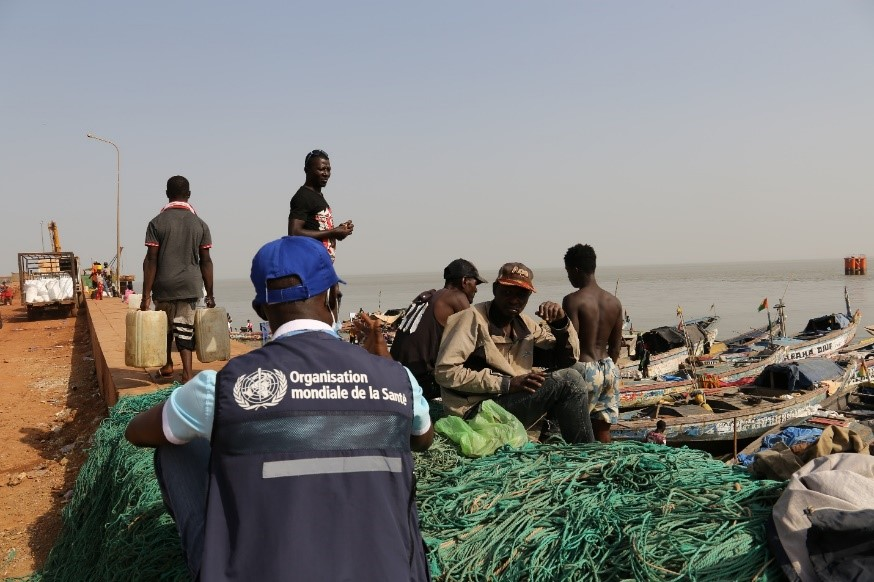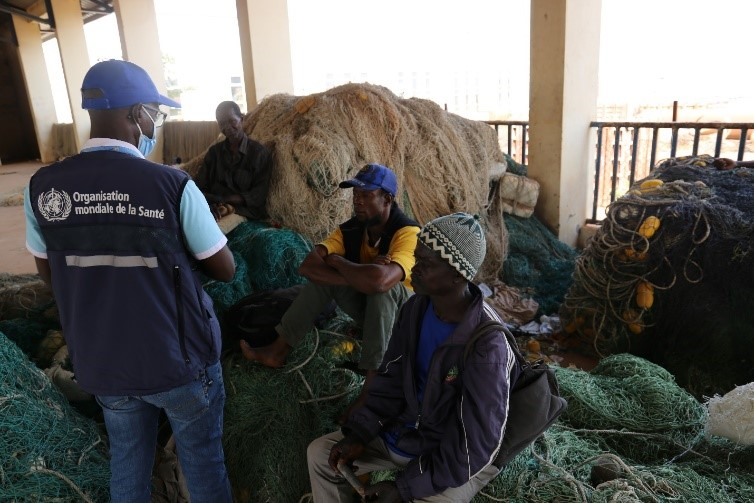Ebola preparedness in Guinea-Bissau: A story of a looming threat addressed with expertise and care
Threats of potential Ebola outbreaks in Guinea-Bissau are not a new phenomenon. The country has had a long history of such threats due to its geographic location in a region predisposed to Ebola outbreaks. On 14 February 2021, an Ebola outbreak was reported in neighbouring Guinea which was quickly declared as an epidemic by Dr Rémy Lamah, the Minister of Health of Guinea. The announcement sent shock waves through neighbouring countries, including Guinea-Bissau which shares a 421 kilometres border with Guinea. The announcement of the Ebola epidemic was particularly worrying because the borders are porous and riddled with unregulated border crossings around the official points of entry. Frequent contact between fishermen from Guinea-Bissau with fishermen from other countries, such as Nigeria, Guinea, Togo, and Senegal, without sufficient health controls was a major source of concern. Faced with such a high risk, Guinea-Bissau quickly mobilized to prepare for the Ebola outbreak in order to protect its population from yet another public health emergency.
How did Guinea-Bissau do it, and how did the WHO Secretariat support Guinea-Bissau?
- Activate core pillars – Responding to this major health concern, the WHO Country Office in Guinea-Bissau promptly activated its five core pillars: risk communication, infection prevention and control, case management, laboratory and surveillance.
- Conduct Ebola simulation exercise – The WHO Country Office supported the Ministry of Health to organize a National Ebola Tabletop Simulation Exercise for the National Rapid Response Team and for health workers in the Bissau region. This simulation exercise was later replicated in six other health regions that were highly predisposed to Ebola, including Bafatá, Biombo, Bolama, Gabú, Quinara and Tombali.
“This simulation was very important as it allowed the team’s skills to be reviewed and gaps to be identified in the management and response to a possible suspected or confirmed case of Ebola in our region.”
Venâncio Cabral
Member of the Regional Rapid Response Team of Bolama
- Capacity-strengthening – To further bolster country preparedness, the WHO Country Office in Guinea-Bissau also strengthened the capacities of the different pillars; for example, the WHO Country Office donated GenXpert tests to the National Laboratory of Public Health which made it possible to carry out tests of suspected Ebola cases. The WHO Country Office, together with the National Institute of Public Health, also trained more than 45 laboratory technicians in the use of GenXpert testing machines during a one-day training.
- Awareness-raising and communication – Recognizing how critical timely and clear communication was, the WHO Country Office deployed a team of professional staff to six regions (Bissau, Bafatá, Bijagós, Gabú, Quinará, and Tombali) to raise awareness and sensitize communities about Ebola prevention. Forty-one communities were sensitized, including religious leaders, women, and youth, which resulted in enhanced understanding and sensitization about Ebola prevention measures. Over 2400 posters were distributed and interviews were conducted with relevant authorities in the seven points of entry, as well as with community leaders to assess their knowledge of the potential severity of the outbreak.
- Deployment of experts to remote areas – The WHO Emergency Team travelled on a mission to the Bijagós Archipelago, which consists of 88 islands, to assess the level of preparedness. Many fishermen from Guinea-Conakry, Liberia and Sierra Leone frequently travel to these islands to do business, a majority of whom travel from one country to another without undergoing any health control or checks at designated border points. Upon arrival to the islands, the WHO team successfully prepared the health centres and communities for active surveillance and prevention of epidemic-prone diseases, particularly for Ebola and COVID-19.
 Photo Credit: © Miguel Almeida, WHO Country Office in Guinea-Bissau
Photo Credit: © Miguel Almeida, WHO Country Office in Guinea-Bissau
Photo Caption: Ebola prevention awareness-raising session with fishermen departing to islands, Port of Bandim, Guinea-Bissau.
“I would like to congratulate WHO’s delegation who strengthened the capacity of the medical team in all 11 health centres.”
Dr Ivansca Janira Carlos de Medina
Regional Health Director of Bijagós
The WHO Country Office effectively responded to the high degree of vulnerability, risk and fragility that Guinea-Bissau’s public health system faces in preparing for and responding to potential epidemics. An important lesson learned is that strengthening the emergency response capacity of the country to respond to Ebola outbreaks requires joint efforts.
The WHO Country Office in Guinea-Bissau continues to support the Government of Guinea-Bissau by investing in preparedness for future potential epidemics. The WHO Country Office is currently in the process of rehabilitating the Infectious Disease Unit at the Military Hospital in Bissau. Once fully operational, Guinea-Bissau will have a treatment centre for infectious diseases, including Ebola, which will provide the needed health safeguards for future health emergencies.

Photo Credit: © Miguel Almeida, WHO Country Office in Guinea-Bissau
Photo Caption: Ebola prevention awareness-raising session with fishermen leaders, Port of Bandim, Guinea-Bissau.
